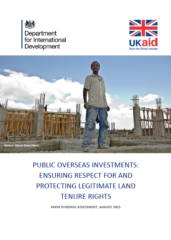
This document investigates how public overseas investments supported by developed country governments respect legitimate land tenure rights, especially in countries without a strong system for protecting existing tenure rights. Initial searches yielded 105 studies for examination, but only 20 of these (mostly in Africa) met the inclusion criterion of using public funds from developed countries;
The analysis begins with a brief overview of evidence from the wider body of material relating to FDI-based and private sector projects. It shows that most large land-based investments fail to take into account either legitimate local rights or local livelihood impacts. The studies also underline the fact that investors must work with host country governments. Therefore, they cannot be the only ones to blame when things go wrong. However, one study shows some investors purposefully seeking land in countries with weak governance systems unable to adequately protect local rights.
Deals are struck ‘behind closed doors’ between governments representing elite interests and investors, with facilitated access to land at the centre of agreements. There is also limited evidence from one high-quality study that while projects with private sector funding (or funds raised by governments in the financial markets) may profess willingness to work with the FAO VGGT and RAI frameworks, the reality on the ground may be ‘business as usual’ with the declared adherence to donor guidelines being merely cosmetic.
Just three studies suggest that local land rights have been adequately taken into account and respected. Measures for assessing this include the extent to which investors have discussed and agreed land access issues with local people and the impact of the project on a range of social and economic indicators. Just one of these studies presents positive news about gender and women’s land rights.
Given the lack of empirical material on ‘public overseas investment from developed countries in developing countries’, the REA underlines the need for more research into how projects can be designed and implemented to respect and protect legitimate local tenure rights. The evidence also suggests that “respecting and protecting” can involve more than simple compensatory or mitigating approaches They can include pre-investment agreements with local rights’ holders that give them an active stake in the proposed investment, which in turn can generate new economic opportunities and enhance local incomes.
